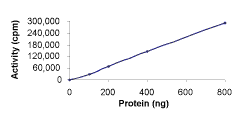
PDGFR beta, Active(P13-11G)
FOR BULK ORDER REQUESTS PLEASE CONTACT US
Description :Recombinant human PDGFRbeta (557-end) was expressed by baculovirus in Sf9 insect cells using a N-terminal GST tag.
Species :Human
Tag :GST tag
Expression System:Sf9 insect cells using baculovirus
Sequence :557-end
Genbank Number :NM_002609
Specific Activity :Sample Kinase Activity Plot. For specific information on a given lot, see related technical data sheet.
Purity :Sample Purity Data. For specific information on a given lot, see related technical data sheet.
Storage, Stability and Shipping :Store product at –70oC. For optimal storage, aliquot target into smaller quantities after centrifugation and store at recommended temperature. For most favorable performance, avoid repeated handling and multiple freeze/thaw cycles.
Applications :Kinase Assay, Western Blot
Molecular Weight :~104kDa
Gene Aliases :JTK12; PDGFR; CD140B; PDGFR1
Scientific Background :PDGFRβ (platelet-derived growth factor receptor ) is a member of the PDGFR family of membrane receptors with intrinsic tyrosine kinase activity. PDGFRβ deficient mice are hemorrhagic, severely anemic and exhibit a defect in kidney glomeruli function (1). However, absence of PDGFRβ has no impact on major blood vessels and the heart. PDGFRβexpression and activity is elevated in several cancers and inhibition of PDGFRβ activity blocks progression of renal carcinoma in an animal model (2).
References :
1. Soriano, P: Abnormal kidney development and hematological disorders in PDGF beta-receptor mutant mice. Genes Dev. 1994 Aug 15;8(16):1888-96.
2. Xu, L. et al: Blocking platelet-derived growth factor-D/platelet-derived growth factor receptor beta signaling inhibits human renal cell carcinoma progression in an orthotopic mouse model. Cancer Res. 2005 Jul 1;65(13):5711-9.
Product Sheets (By Lot #) :
Research Areas :Cancer, AKT/PKB Pathway, ERK/MAPK Pathway, Receptor Tyrosine Kinases, Cancer, AKT/PKB Pathway, ERK/MAPK Pathway, Receptor Tyrosine Kinases
